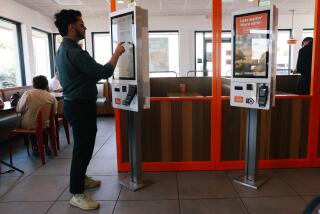Service With a Scripted Smile : Workplace: Each time a waiter, teller or airline agent greets us with a bogus dose of simulated sincerity, our chance of actually having a nice day slips a bit more.
- Share via
H i, how are you folks doing today? That’s great. My name is Michael and I’ll be your writer for this story. If there’s anything I can get you, be sure and let me know. Now, just settle back and prepare for an enjoyable newspaper reading experience.
We are under a siege of insincerity.
From waiters who treat diners to mandatory “Happy Birthdays,” to clothing-store clerks programmed to shower their prey with well-rehearsed flattery, bogus bonhomie is the order of the day.
And each time a service worker pastes on a big smile and recites a memorized script, the chances of making a real human connection sink closer to zero.
It’s depressing to contemplate--or would be, if so many of us hadn’t grown numb to it, like lab rats zapped one time too many.
So why do bosses increasingly ask their workers to simulate sincerity? What does this do to workers--and to the rest of us?
It can all be traced to the profit motive. Yes, the quest for big bucks!
America’s fast-growing service businesses imitate factory owners, who began breaking complex tasks into simpler routines during the Industrial Revolution, says sociologist Robin Leidner in her book “Fast Food, Fast Talk: Service Work and the Routinization of Everyday Life.”
Simplifying service work with the help of routines means bosses can use cheaper, less-skilled workers to offer “better,” more consistent service.
But there are some hidden assumptions, the main one being that customers don’t notice whether they’re treated as individuals.
*
Has anyone ever told you that you look terrific in lavender?
“Almost all scripting of interactions, regardless of motive and degree of deception, is based on some unflattering premises about the intended audience,” Leidner says.
“Routinization assumes that people are largely interchangeable, that they are not deserving of sincerity (and) possibly that they can be easily duped.”
But that assumption fails with those who see scripts as impersonal and believe companies use them to manipulate customers. Such people might ignore a canned spiel, even resorting to outright rudeness when a worker is too persistent.
“Giving these people the benefit of the doubt often means you’re a patsy,” says Leidner, an assistant professor at the University of Pennsylvania. “The (scripted) techniques more or less put you in the position of being polite and letting them have their way or overriding the ordinary rules of human interaction.”
*
I’d like to talk to you about a carpet-cleaning special we’re offering in your neighborhood.
“Fast Food, Fast Talk,” which grew out of Leidner’s doctoral dissertation, explores the different worker routines adopted by McDonald’s Corp. and Combined Insurance Co.--the latter’s founder espoused the “Positive Mental Attitude” sales approach.
During her research in 1986-1987, Leidner attended McDonald’s Hamburger University in Oak Brook, Ill., then worked as a restaurant crew member. She also audited the Chicago-based insurance company’s training program and accompanied agents on sales calls.
“I started out more or less thinking, ‘This is oppressive.’ I came away with more of a mixed view of this kind of routinization.”
At McDonald’s, where computers made food preparation and order-taking almost idiot-proof, workers learned to call customers “guests” and memorized the Six Steps of Window Service. They were told to smile and be cheerful and polite at all times, Leidner says, but they also were supposed to “be themselves.”
Workers liked the routines because they made it easier for them to do their jobs, Leidner says, but they chafed when customers were rude and they were not permitted to respond in kind.
*
Would you like fries with that?
Ironically, overly rigid routines themselves may provoke customers to mistreat workers, if workers are seen as robots unable to meet their personal needs.
“To the extent there is a very definite routine set up that the employee doesn’t have the authority to change, in a lot of settings people are forced to behave very badly,” she says. “It’s sort of built-in idiocy.”
During her own stint behind the counter, Leidner had moments of real human contact amid the pressure to provide quick service. She still recalls working the register one busy, noisy shift.
“This woman said, ‘You deserve a medal for working in here.’ Every so often there’d be contact with the person, instead of a role, that I found quite pleasing.”
*
Have you considered the benefits of whole life insurance?
Combined Insurance showed the extent to which a company may try to change not only the way its employees act, but also what they think and feel, she says.
Trainees rehearsed sales scripts, as well as gestures, intonation and eye contact. They also learned jokes to use as ice breakers on sales calls.
Following the Positive Mental Attitude approach, trainees also stood up several times a day and yelled, “I feel healthy! I feel happy! I feel terrific!”
The company even discouraged salespeople from listening to country-Western music because the familiar themes of cheatin’-hearts/my-baby-done-left-me would lessen the optimism it wanted to cultivate.
While many people prefer genuine, personalized service, Leidner concludes, others see scripted pleasantness as a plus.
“I’m sure there’s people who think, ‘Boy, the post office sure could use some of that,’ ” she says.
*
It’s been a real pleasure flying with you today.
Meanwhile, sociologist Arlie Hochschild, who writes about how bosses ask workers to manipulate their emotions, warns such practices may cause workers to lose track of their real feelings.
In her book “The Managed Heart: Commercialization of Human Feeling,” Hochschild tells how airlines train flight attendants to stay calm when confronted by obnoxious passengers. They are urged to see conflicts from the passenger’s point of view or to “reframe” the passenger as childlike or in pain--anything to keep from blowing up.
Hochschild, a UC Berkeley professor, expects to see even more scripts and routines as companies compete to provide better “service.”
There is an alternative, she stresses, one that doesn’t necessarily assume that workers and employers are at odds.
“The solution is to give workers more autonomy over how they resolve a variety of problems,” she says. “There’s another way of offering ‘good service,’ which first involves treating your workers well, so they feel like human beings, and then saying what the standards are.”
*
I’m sorry. There’s no listing of anyone with that name.
Even as many companies seek greater control over their workers’ lives, some claim to have found that customers don’t always want more uniformity.
At U.S. West, a regional telephone company serving 14 Western states, the 4,000 directory-assistance and long-distance operators have more latitude in handling customers than they did a decade ago.
“We’ve become much more flexible over the last 10 years,” says Cathy Hines, the company’s operator training manager. “There was a time when we had what operators called ‘canned phrases’--stuff you had to say. We’ve come a long way in empowering our operators.”
Although most operators enjoy using their own words, some old-timers long for the days when they ran on autopilot, says Hines, herself a former operator.
“There are a few people who’ve worked for us for years who say, “Just tell me what to say.’ ”
Hines says allowing operators to engage in a brief chat every so often also helps relieve the monotony of answering up to 800 calls a day.
“Generally speaking,” she says, “operators will say they like being treated as people, not as machines.”
Even McDonald’s, which prides itself on perfect burgers and fries, acknowledges that when it comes to human behavior, more uniformity is not necessarily better.
*
You wouldn’t like some extra pickles or ketchup with that?
“Every single customer that comes up to the counter is an individual,” says Shirley Rogers, dean of Hamburger University. Accordingly, employees may use their own phrases when serving customers.
“We can’t write the words for them,” she says. “We can’t talk for them.”
Rogers acknowledges that the company used to micromanage counter service to a greater extent than now.
“Our culture has grown past that,” she says. “We have empowered our people to help us run the business. They are not robots.”
And have a nice day.
More to Read
Inside the business of entertainment
The Wide Shot brings you news, analysis and insights on everything from streaming wars to production — and what it all means for the future.
You may occasionally receive promotional content from the Los Angeles Times.










